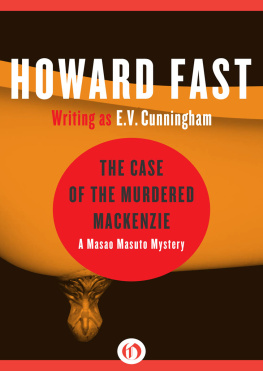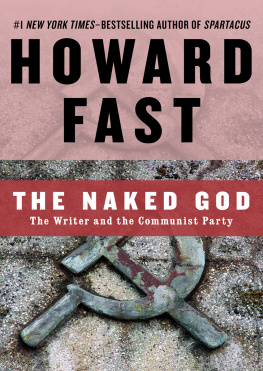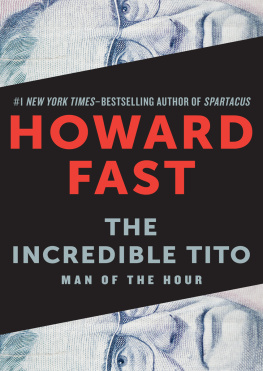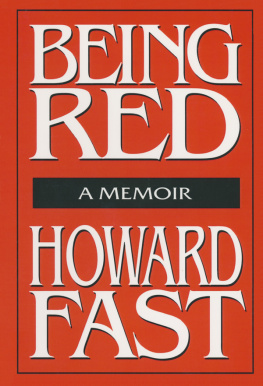Howard Fast - The Case of the Kidnapped Angel
Here you can read online Howard Fast - The Case of the Kidnapped Angel full text of the book (entire story) in english for free. Download pdf and epub, get meaning, cover and reviews about this ebook. genre: Detective and thriller. Description of the work, (preface) as well as reviews are available. Best literature library LitArk.com created for fans of good reading and offers a wide selection of genres:
Romance novel
Science fiction
Adventure
Detective
Science
History
Home and family
Prose
Art
Politics
Computer
Non-fiction
Religion
Business
Children
Humor
Choose a favorite category and find really read worthwhile books. Enjoy immersion in the world of imagination, feel the emotions of the characters or learn something new for yourself, make an fascinating discovery.

- Book:The Case of the Kidnapped Angel
- Author:
- Genre:
- Rating:4 / 5
- Favourites:Add to favourites
- Your mark:
- 80
- 1
- 2
- 3
- 4
- 5
The Case of the Kidnapped Angel: summary, description and annotation
We offer to read an annotation, description, summary or preface (depends on what the author of the book "The Case of the Kidnapped Angel" wrote himself). If you haven't found the necessary information about the book — write in the comments, we will try to find it.
The Case of the Kidnapped Angel — read online for free the complete book (whole text) full work
Below is the text of the book, divided by pages. System saving the place of the last page read, allows you to conveniently read the book "The Case of the Kidnapped Angel" online for free, without having to search again every time where you left off. Put a bookmark, and you can go to the page where you finished reading at any time.
Font size:
Interval:
Bookmark:
Howard Fast
The Case of the Kidnapped Angel
1
As a Buddhist policeman on the Beverly Hills police force, Detective Sergeant Masao Masuto abhorred superstition. For one thing, it went against his Zen training, for another, it defied common sense; so when a day began not only badly but improbably and continued in such manner, he refused to blame anything other than coincidence. The day was early in November, close to his birthday, which marked him as a Scorpio; but his distaste for the nonsense called astrology-which pervaded Los Angeles-was as great as his distaste for any other superstition.
For all that, he found it quite extraordinary that he should be interrupted by a thief during his morning meditation. He had begun his meditation at six A.M., in the first faint gray light of dawn. His meditation room was a tiny sun porch at the rear of his Culver City cottage, where he lived with his wife, Kati, and his two children. Since the two children were of different sexes, there was no bedroom to spare. Masuto did not complain. Indeed, he was grateful for the nine-by-twelve sun porch, which was large enough, since it contained no furniture other than a meditation mat and pillow; and there he was, sitting on the pillow cross-legged in what is known as the lotus position, wrapped in his saffron-colored robe, when a sixteen-year-old Chicano boy forced open one of the windows, climbed through, and stood facing him.
For a long moment the Mexican boy stood motionless, staring at the nisei detective, who sat motionless, returning the stare. For Masuto, it was a double effrontery-first that a thief should invade a policemans house, and second that he should be interrupted in his meditation. Then the boy, digesting the fact that Masuto was alive, turned to flee, and Masuto thrust out a leg and tripped him. Then, with the boys arm in a hammerlock, Masuto said, Get up and dont struggle, because if you do, your arm will be broken.
Kati, alarmed by the commotion, arrived at the meditation room in time to hear this, and her comment was, I dont believe this. A little boy, and you threaten to break his arm?
She was right. The Chicano boy was quite small. Masuto let go of his arm and led him from the room by the collar of his shirt. Masuto was slightly over six feet tall and, at this moment, somewhat ashamed of himself. The boy was skinny and shivering.
I didnt do nothing. Let me go, the boy said.
Hes a thief, Masuto explained to Kati. Now Masutos two children, Ana, age eight, Uraga, age ten, were also watching, standing in their nightclothes and regarding Masuto with what he could only interpret as accusatory stares.
Why dont you let him go? Kati asked.
Hes a thief. Im a policeman.
Youre a cop? the boy said. My God, I got as much brains as a cockroach, breaking into a cops house.
Whats your name? Kati asked him.
Pedro.
And youre hungry. Did you have any breakfast?
He shook his head.
And that did it, Masuto explained to his partner an hour later in the homicide office of the Beverly Hills police force. This kid breaks into my house, and Kati feeds him.
You know what it is, Masuto. Its those consciousness-raising sessions shes been going to. Did you call the Culver City cops?
No.
You let him go?
I have to live with my wife. Anyway, he swore up and down hed never done it before and wouldnt do it again, and the only weapon he had on him was a screwdriver. If I turn him over to the cops, its either a suspended sentence or juvenile. Either way, he gets a record and maybe worse.
Masutos partner, Detective Sy Beckman, nodded. Maybe youre right. But I hate these stupid kids. Amateurs. We can deal with the professionals, but the amateurs screw things up. I dont know-no more lines of professional pride. These days everything is amateur. Maybe this kidnapping too. It has the earmarks.
What kidnapping?
Angel Barton was kidnapped, and the captains car was stolen. The two aint connected, except that Wainwrights sore as hell. Thats a coincidence-your house broken into and Wainwrights car stolen. Do you suppose theyre after the Beverly Hills cops?
When did that happen?
The car?
No, the kidnapping.
Sometime last night. I just got here ten minutes ago, so Im not filled in on the details. Wainwright threw these files at me to play shuffleboard with-theyre all on people associated with Mike Barton, but from here what we got is strictly nothing.
Wheres the captain now?
In his office with a roomful of civilian brass. He called twice to ask where the hell you were.
At that moment the telephone on Masutos desk rang. He picked it up and Wainwrights voice asked him where the hell he was.
Ill be right in.
In the dozen steps between his office and Captain Wainwrights-he was chief of detectives in the Beverly Hills police force-Masuto tried to remember and piece together what he knew about the Bartons. He knew at least a little and sometimes a great deal about most of the celebrities who lived in Beverly Hills, which is not to say that he knew many of them personally. What he knew of the Bartons had been gleaned from newspapers and from his wife, Kati, who was a much more enthusiastic movie fan than Masuto. Mike Barton was one of a half-dozen or so bankable stars, which meant that his name alone, associated with a film project, was enough to bring in the financing necessary to make the film. It was said that he had been paid a million and a half to star in his last film and that he was asking two million for his next. He was a tall, well-built man, with a craggy face, russet hair, and blue eyes, and given the right director, he could perform as an actor. Masuto tried to recall him on the screen, and while he felt he must have seen one of his films, he was not absolutely certain.
Concerning Bartons wife, Angel, his information had come totally from Kati, who read the gossip columns and pored over the picture magazines and was absolutely enchanted by both the name and the public image of Angel Barton.
The most intriguing thing about Angel Barton was that she had no traceable past, not even a real name available to the columnists on The Hollywood Reporter and Daily Variety. When questioned on this subject, she simply smiled her wonderful smile, and her husband, in reply to the same question, told reporters that since her name was Angel, she had obviously dropped from heaven. He himself had christened her Angel, and neither of them would discuss any prior existence. This was taken by the media as a publicity stunt, and while several enterprising reporters set out to discover who Angel actually was, none of them were successful. The secret was well kept.
And as Kati had put it to her husband, She does look like an angel. More precisely, she looked like the romantically remembered Marilyn Monroe, with the same golden curls and wide blue eyes. She had a very faint, almost undiscernable foreign accent which no one could place and a way of making any man she spoke to feel that he was the most important member of the male world. She and Mike Barton had been married two years ago, but whether it was her first marriage or not Kati had never mentioned. The rest of what Kati had told him about Angel Barton was of no great consequence, nor could Masuto recall much of it as he entered Captain Wainwrights office.
The small office was crowded. Joe Smith, the city manager, was there, along with Al Freeman, who was the mayor-an honorary, unpaid job-and three other men, introduced in turn as Frank Keller of the FBI, very young, very pompous; Jack McCarthy, Bartons lawyer; and Bill Ranier, Bartons business manager. McCarthy was in his late fifties, overweight, sure of himself, with a wide local reputation among film people; Ranier was middle forties, thin, nervous, impatient.
Font size:
Interval:
Bookmark:
Similar books «The Case of the Kidnapped Angel»
Look at similar books to The Case of the Kidnapped Angel. We have selected literature similar in name and meaning in the hope of providing readers with more options to find new, interesting, not yet read works.
Discussion, reviews of the book The Case of the Kidnapped Angel and just readers' own opinions. Leave your comments, write what you think about the work, its meaning or the main characters. Specify what exactly you liked and what you didn't like, and why you think so.








